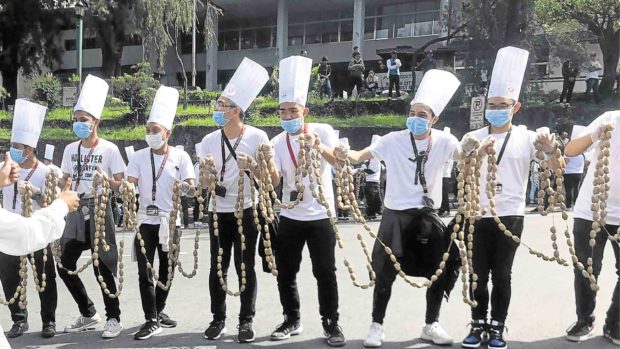In Baguio, tourists treated to ‘longest longganisa chain’

‘LONGGANISA’ IN FOCUS Baguio’s version of “longganisa” has a distinct taste that tourists love. This year, the city’s association of hotels and restaurants features the native sausage as one of the summer capital’s best products. —VINCENT CABREZA
BAGUIO CITY, Benguet, Philippines — Some 1,350 culinary students on Sunday paraded a 7.8-kilometer chain of garlic “longganisa” (pork sausage) as part of the annual Hotel and Restaurant Tourism (HRT) weekend.
Cheered on by residents and visitors, the students unspooled the small native sausages produced by the Alabanza family at 9 a.m. on Session Road.
Eight workers produced the sausages over 10 weeks, hoping to beat a record length of 7.3 km set in 2010 when the Alabanza family held their second longest longganisa parade for the Hotel and Restaurant Association of Baguio.
They first produced a 3-km chain of longganisa in 2006.
A day before the longganisa parade, Baguio Meat Vendors Association staged a “food taste” activity at the public market to promote pork consumption and allay fears of the African swine fever now sweeping several pig farms in Luzon.
Article continues after this advertisementDeputy Executive Secretary Alberto Bernardo, the HRT weekend’s guest, said food was an “expression of our cultural identity” and was part of the government’s tourism blueprint.
Article continues after this advertisementThe event was a private sector initiative designed to draw tourists.
Baguio has been associated with garlic longganisa in the same way the Ilocos region has its “pinakbet,” Bacolod City’s “inasal” and the Cordillera’s “pinikpikan” chicken soup, Bernardo said.
Quality tourism
He said the local food industry should “sharpen its competitive skills toward quality tourism.”
The students from five culinary schools carried a total of 3,633 kilograms of sausages, said Vonda Alabanza, who manages the family business.
The chain was made up of 11,910 dozens of sausages, which were later sold to the public for P70 a dozen. —Vincent Cabreza